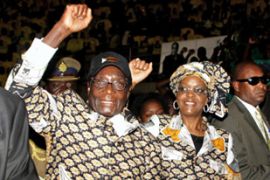Mugabe welcomes EU delegation
European officials meet Zimbabwe’s president for first time in seven years.

And though Mugabe said he had established a “good rapport” with the delegation, he also spoke of his frustration.
“I don’t get any indications … I don’t know what they want us to do, we have implemented the Global Political Agreement”, Mugabe said.
On Friday, Mugabe had hit out at Western countries calling them “neocolonialists” who can “never be our friends”.
Regime change
“They still want our land,” he told the youth wing of his Zanu-PF party on Friday.
“Why are voices being sounded across the world for regime change to take place in Zimbabwe?”
|
“They still want our land. Why are voices being sounded across the world for regime change to take place in Zimbabwe?” Robert Mugabe, |
Mugabe, who has ruled Zimbabwe since its independence from Britain nearly three decades ago, said his people were being punished and forced to live in poverty because of Western sanctions.
The EU disputes that claim.
Karel De Gucht, the EU development commissioner, who is also part of the delegation, said the bloc’s sanctions against Zimbabwe have “no impact on the common population”.
The European officials plan to meet both Mugabe and Morgan Tsvangirai, Zimbabwe’s prime minister, whose appointment as part of a South African-mediated power sharing deal has begun to reverse years of isolation by world powers.
But Zimbawbe’s government has been slow to realise change due to ongoing differences between Mugabe and Tsvangirai.
Concerns and obstacles
Tsvangirai’s Movement for Democratic Change (MDC) party accuses Mugabe’s Zanu-PF of stalling on reforms and continuing to attack and harass MDC activists.
Although Zimbabwe’s chronic hyper-inflation has been calmed, millions of Zimbabweans remain poor and many suffer from malnutrition.
Many blame Mugabe’s land reform policies, launched nine years ago, that saw white-owned farms resettled with blacks in a bid to redress colonial-era inequities.
Western donors have been reluctant to resume aid funding until there are signs of an end to what they see as human rights violations.
The EU delegation was in South Africa’s coastal city of Cape Town on Friday, meeting South African officials. The two groups noted Zimbabwe’s progress made in implementing the power-sharing agreement.
But in a joint statement they expressed “concerns about the environment” in which the new government was operating.
The statement called for “all parties to remove all obstacles” to the “effective functioning of the inclusive government”.
Zimbabwe says it needs $10bn in foreign reconstruction aid.